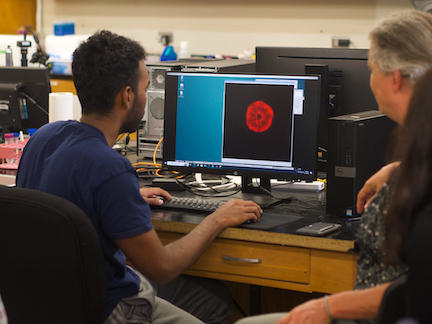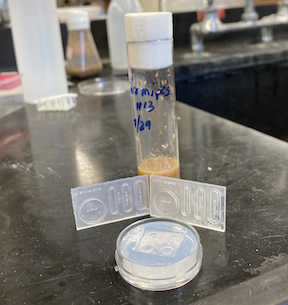What is the KITP QBio Summer Research Course?
Understanding fundamental problems in biology requires both advanced experiments and the quantitative/theoretical approach traditionally taken by physics. The Santa Barbara Advanced School of Quantitative Biology “QBio” summer course trains early-career scientists to integrate these different approaches by having them do it all–they take part in novel, team-taught lab experiments led by renowned faculty; they integrate quantitative modeling and theory into their experimental design and data analysis; and they become part of an interdisciplinary community of biologists and physicists. The course aims to teach students to communicate and collaborate with people with different and complementary backgrounds: eliminating the scientific language barrier is a major goal of the course. Students leave the course with an expanded network of peers, senior program participants and course instructors. Ideally, students emerge from the course with much broader scientific horizons and confidence in their own ability to chart the path of their own research.
Who should apply?
The course is geared toward advanced graduate students and postdocs, whose rigorous disciplinary training and significant research experience has prepared them to absorb material through high-level seminars and a research environment. The high instructor-to-student ratio and team-based project format create a supportive environment, but the course is intensive and fast-paced. With only 5 weeks to work, students must be self-driven to get results. Since participants do much of their learning from teammates and through informal interactions with program participants, openness to others’ ideas (particularly those from different scientific and cultural backgrounds) is crucial, and the confidence to initiate conversations with senior scientists help successful students make the most of their time at KITP. Successful applicants typically show curiosity, a clear idea of how the course will impact their research program, a desire to do interdisciplinary work, and strong quantitative skills.
Last day #kitpqbio. After of 5 weeks of 24/7 work, students present their incredible achievements. Pure science! Then bbq at the legendary Munger residence. What a summer! Thanks @KITP_UCSB! pic.twitter.com/e5yq25re0W— Xavier Trepat (@XavierTrepat) August 25, 2023
What do students say about the course?
"Participating in research projects outside my PhD work and interacting with other researchers revealed that - (a) I am broadly curious about biology, (b) I can ask questions and formulate testable hypothesis and (c) I enjoy science. When one of the instructors admired my efforts in his project and offered me a postdoc position, I realized that my abilities to do science were greater than my perception and decided to develop them further by continuing in research." - Sapna Chhabra (2019)

“I think one of the greatest values of this course has been the ability to interact with people from different fields and be able to learn the jargon that they use in one field and understand it at a deep enough level that we can then have conversations and build on that. Being able to interact with the physicists, theorists, and other experimentalists has helped broaden my knowledge base and also made me more comfortable, as a student, being able to talk across different fields and learn from people doing very different types of research, but all interested in and centered around different kinds of questions.” - Jess Kanwal (2018)
“For me, the project was very helpful for understanding the gap between the idealized data we theorize about and the data we actually have, and the project and tutorials left me much more versed in common computational techniques for bacterial genomics. The morning talks and the connections built over many hours with the other students in lab and over meals was also inspiring and makes me more likely to continue pursuing an academic career.” - Michael McLaren (2017)

“The KITP/QBio summer course is quite unique in the world and has been a true accelerator for my career. It first gave me a broad, comprehensive and timely overview on the field of morphogenesis, from both physics and biology points of view. This has been critical to nurture my own research project and to successfully apply to group leader positions. As a theoretician, the school allowed me to perform my first biological experiments ever. I realized that 1) I was actually not too bad in doing experiments, 2) I’d probably very much like doing my own ones one day. . . . The practicals in small groups, mixing biologists and physicists was a fantastic opportunity to learn from each others and to gain better teaching skills. This was a perfect mix of theory and experiments, and a perfect setting to make emerge original research ideas.” - Herve Turlier (2016)
Spent amazing five weeks @KITP_UCSB during #morpho23 and #kitpqbio. I enjoyed the experimental work with "TEAM HANGRY", instructed by @viktri08 and @KStapornwongkul. Can't wait to be back @BauschLab to try new ideas, I got during discussions within this stimulating environment. pic.twitter.com/EbrF2KYGvW
— Marion Raich (@marion_raich) August 28, 2023
